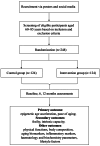Multidomain intervention for delaying aging in community-dwelling older adults (MIDA): study design and protocol
- PMID: 40297922
- PMCID: PMC12042233
- DOI: 10.1080/07853890.2025.2496409
Multidomain intervention for delaying aging in community-dwelling older adults (MIDA): study design and protocol
Abstract
Background: The exploration of interventions to delay aging is an emerging topic that promotes healthy aging. The multidomain intervention has the potential to be applied in the field of aging because it concentrates on the functional ability of older adults. There is currently no literature reporting on a multidomain intervention involving cognition, exercise and nutrition for delaying aging.
Methods: The Multidomain Intervention for Delaying Aging in Community-dwelling Older Adults (MIDA) is a Zelen-design randomized controlled trial with a 6-month intervention duration. The multidomain intervention comprises cognitive training, exercise training, and nutritional guidance, delivered through both group sessions and individual family interventions. A total of 248 participants aged 60 to 85 years will be randomized to the intervention group or control group and followed up for 12 months. The primary outcome is the change in epigenetic age acceleration and pace of aging following the multidomain intervention. The secondary outcomes are the changes in frailty score and intrinsic capacity Z-score. Other outcomes include physical functions, body composition, aging biomarkers, inflammatory markers, haematology and biochemistry parameters, and lifestyle factors.
Conclusions: This study will explore the effects of the multidomain intervention on delaying aging in community-dwelling older adults. We aim to introduce a new approach to delaying aging and offer a practical multidomain intervention strategy for healthcare institutions.
Keywords: DNA methylation age; Multidomain intervention; biological age; frailty; intrinsic capacity.
Conflict of interest statement
No potential conflict of interest was reported by the authors.
Figures


Similar articles
-
Roles of Baseline Intrinsic Capacity and its Subdomains on the Overall Efficacy of Multidomain Intervention in Promoting Healthy Aging among Community-Dwelling Older Adults: Analysis from a Nationwide Cluster-Randomized Controlled Trial.J Prev Alzheimers Dis. 2024;11(2):356-365. doi: 10.14283/jpad.2024.20. J Prev Alzheimers Dis. 2024. PMID: 38374742 Clinical Trial.
-
Efficacy of multidomain interventions to improve physical frailty, depression and cognition: data from cluster-randomized controlled trials.J Cachexia Sarcopenia Muscle. 2020 Jun;11(3):650-662. doi: 10.1002/jcsm.12534. Epub 2020 Mar 5. J Cachexia Sarcopenia Muscle. 2020. PMID: 32134208 Free PMC article.
-
The cost effectiveness of a multidomain intervention on physical, cognitive, vascular, dietary and psychosocial outcomes among community dwelling older adults with cognitive frailty in Malaysia: The AGELESS Trial.Alzheimers Res Ther. 2025 May 13;17(1):101. doi: 10.1186/s13195-025-01722-w. Alzheimers Res Ther. 2025. PMID: 40361174 Free PMC article. Clinical Trial.
-
Effect of long-term physical exercise and multidomain interventions on cognitive function and the risk of mild cognitive impairment and dementia in older adults: A systematic review with meta-analysis.Ageing Res Rev. 2024 Sep;100:102463. doi: 10.1016/j.arr.2024.102463. Epub 2024 Aug 22. Ageing Res Rev. 2024. PMID: 39179115
-
Multi-Domain Interventions for Dementia Prevention - A Systematic Review.J Nutr Health Aging. 2023;27(12):1271-1280. doi: 10.1007/s12603-023-2046-2. J Nutr Health Aging. 2023. PMID: 38151879
References
Publication types
MeSH terms
LinkOut - more resources
Full Text Sources
Other Literature Sources
Medical
